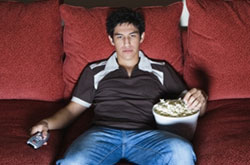February 11th, 2011 by John Mandrola, M.D. in Opinion, Research
No Comments »

I’d like to talk about how rodents, relationships, and riding relate to overall health and wellness.
This idea comes from a nicely-written New York Times piece entitled, “Does Loneliness Reduce the Benefits of Exercise?” Here, Gretchen Reynolds reviews a few intriguing studies about how relationships may affect exercise, stress hormone levels, and intelligence. The combo caught my eye.
Anyone who pays attention to wellness knows that exercise produces more flexible arteries, more durable hearts, and leaner body shapes. These benefits are obvious, and honestly, sometimes a bit tiresome to write about.
To me, a far more interesting — and lesser known — benefit of regular exercise is that it might make us smarter. Here’s where the rodents come into the story.
As was summarized in the New York Times piece, when researchers allowed rats and mice access to running wheels they observed (a) that they all ran, and (b) those rats that did run scored better on rodent IQ tests, and actually grew more brain cells. This is a striking finding because nerve cells — unlike blood, GI and skin cells, which turnover rapidly — grow very slowly, if at all.
But that’s not the entire story. The Princeton researchers wanted to know whether the rat’s social relationships could have measurable biologic effects.
It turns out that rodents — like humans — are quite social. So social, in fact, that in these trials the brain-growing effect of exercise was blunted when rodents lived alone. Compared to rats and mice that lived in groups, those that were kept in isolation failed to grow new nerve cells in response to exercise. And importantly, isolated rats produced higher levels of stress hormones than those who lived in groups, even though both groups ran the same distance. Read more »
*This blog post was originally published at Dr John M*
November 23rd, 2010 by Glenn Laffel, M.D., Ph.D. in Better Health Network, News, Research
No Comments »

 Like their counterparts in other first-world countries, French people know about the health benefits of exercise. And French culture has emphasized, even worshipped, good looks (which these days translates to “fit and trim.”)
Like their counterparts in other first-world countries, French people know about the health benefits of exercise. And French culture has emphasized, even worshipped, good looks (which these days translates to “fit and trim.”)
So it’s surprising that the French avoid fitness centers as vigorously as factory-produced croissants. But they do.
According to the International Health, Racquet and Sportsclub Association, just 5.4 percent of French people were members of a fitness club in 2008. That’s substantially less than their counterparts in Italy (9.5 percent), the UK (11.9 percent), and Spain (16.6 percent).
“It appears that more people are sitting in cafes smoking cigarettes and drinking coffee than working out … the French don’t see fitness as a lifestyle,” American-born fitness consultant Fred Hoffman told MSNBC. Hoffman has lived in Paris for two decades. Read more »
*This blog post was originally published at Pizaazz*
August 20th, 2010 by BarbaraFicarraRN in Better Health Network, Health Tips, Research
No Comments »

 We’ve all made the excuses: You can’t face the drive to the gym, you’re too tired at night, getting up in the morning is a chore, or it’s too hot or cold outside. So you cozy up on the couch in front of the television. If you’re a couch potato, you’re a gambler — with your life.
We’ve all made the excuses: You can’t face the drive to the gym, you’re too tired at night, getting up in the morning is a chore, or it’s too hot or cold outside. So you cozy up on the couch in front of the television. If you’re a couch potato, you’re a gambler — with your life.
Unfortunately you’ll need a big sofa because you’re not the only one whose heart isn’t in physical activity. About 60 percent of adults in the U.S. are not getting the exercise they need, according to a report from the U.S. Surgeon General.
It’s time to get up and face — or better yet, dance to — the music! Here are a few facts that may get you moving for your heart’s sake. Read more »
*This blog post was originally published at Health in 30*
June 26th, 2010 by Toni Brayer, M.D. in Better Health Network, Health Tips, News, Research
2 Comments »

Talk about a cruel trick of nature! A study funded by the National Institutes of Health (NIH) and published in the Journal of the American Medical Association (JAMA) shows that physical activity prevents weight gain in middle-aged and older women ONLY IF THEY ARE ALREADY AT IDEAL WEIGHT. Did you read that? It means that the recommended guidelines advocating 150 minutes of exercise a week isn’t sufficient to prevent weight gain in most middle-aged women.
The Harvard-associated researchers assessed weight changes associated with various levels of physical activity on 34,079 women who had been followed since 1992 in the Women’s Health Study. They stratified women as “inactive” (less than 150 minutes a week of moderate level physical activity), “intermediately active,” or “highly active” if they performed a high, strenuous level of activity. All three groups showed similar weight gain over a mean of 13 years of follow up. Read more »
*This blog post was originally published at EverythingHealth*
May 30th, 2010 by BarbaraFicarraRN in Better Health Network, Health Tips
No Comments »

 “Play, Incorporating Animistic and Magical Thinking Is Important Because It: Fosters the healthy, creative and emotional growth of a child; Forms the best foundation for later intellectual growth. Provides a way in which children get to know the world and creates possibilities for different ways of responding to it. Fosters empathy and wonder.” — Rachel Carson, “A Sense of Wonder”
“Play, Incorporating Animistic and Magical Thinking Is Important Because It: Fosters the healthy, creative and emotional growth of a child; Forms the best foundation for later intellectual growth. Provides a way in which children get to know the world and creates possibilities for different ways of responding to it. Fosters empathy and wonder.” — Rachel Carson, “A Sense of Wonder”
Remember “Red Light, Green Light,” “One-Two-Three,” “Tag, You’re It,” “Mother, May I?” or “Kickball?” These are just some of the good old-fashioned outdoor games kids used to play, and they are making a comeback. There’s nothing better than the sound of kids playing outdoors. Even kids playing outside making up their own games can bring them a lot joy and can be great exercise. With all the technology that surrounds us today, it’s great to see kids playing in the park and in their backyards.
It’s no secret that outdoor play and fresh air are great for kids’ overall physical and emotional well-being. In fact, a study in the journal Pediatrics concludes that children ages 8 and 9 who had more than 15 minutes of recess had better classroom behavior. This study suggests that school children in this age group should be provided with daily recess. Read more »
*This blog post was originally published at Health in 30*






 We’ve all made the excuses: You can’t face the drive to the gym, you’re too tired at night, getting up in the morning is a chore, or it’s too hot or cold outside. So you cozy up on the couch in front of the television. If you’re a couch potato, you’re a gambler — with your life.
We’ve all made the excuses: You can’t face the drive to the gym, you’re too tired at night, getting up in the morning is a chore, or it’s too hot or cold outside. So you cozy up on the couch in front of the television. If you’re a couch potato, you’re a gambler — with your life.
 “Play, Incorporating Animistic and Magical Thinking Is Important Because It: Fosters the healthy, creative and emotional growth of a child; Forms the best foundation for later intellectual growth. Provides a way in which children get to know the world and creates possibilities for different ways of responding to it. Fosters empathy and wonder.” — Rachel Carson, “
“Play, Incorporating Animistic and Magical Thinking Is Important Because It: Fosters the healthy, creative and emotional growth of a child; Forms the best foundation for later intellectual growth. Provides a way in which children get to know the world and creates possibilities for different ways of responding to it. Fosters empathy and wonder.” — Rachel Carson, “







